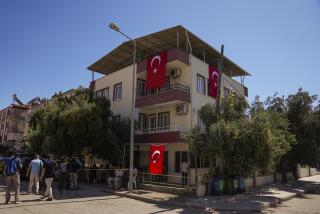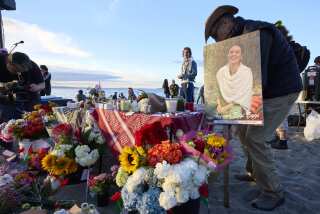Where Girls Marry Rapists for Honor
- Share via
DIYARBAKIR, Turkey — Rojda was 13 when she was raped two years ago by a neighbor in this hardscrabble Kurdish province. In order to “cleanse” her honor, she was forced to marry her attacker in an unofficial Islamic-style ceremony. He later was convicted of raping a 7-year-old boy and has been imprisoned.
But Rojda’s troubles were far from over, according to an account of her ordeal provided by her family and attorneys. She allegedly was raped again in March by her father-in-law, who she said demanded she prostitute herself to earn her keep. When Rojda refused, the relatives and attorneys charge, a group of men held her down and sliced off her nose.
Police raided their home after being tipped off by neighbors, who heard her cries. The men were briefly detained, then set free -- though they have since been rearrested.
Rojda’s story is not unusual: Human rights groups and Turkish officials say violence against women is widespread in Turkey, though statistics are hard to come by because so many attacks go unreported. They blame the violence on poverty, a lack of education and the patriarchal structure prevalent in much of Turkish society.
As this nation seeks to become the European Union’s first predominantly Muslim member, its Islam-rooted government has teamed up with the EU and other international groups to combat abuses through a series of nationwide projects and campaigns.
Their efforts are evident here in Diyarbakir, where the bar association is training local administrators to understand and implement new laws that, among other things, broaden women’s rights and stiffen penalties for their abusers. The $500,000 project is being funded by the EU.
“We have trained 700 officials over the past year; awareness is growing,” association President Sezgin Tanrikulu said last week. One such trainee learned of Rojda’s plight soon after her alleged attackers were initially freed. He took her to Tanrikulu, complaining that justice had not been served.
Rojda, a childlike figure with enormous dark eyes set above her disfigured nose, looked terrified, recalled Tanrikulu. “We pressed fresh charges on her behalf, and the men were rearrested,” he said.
Her mother, Serife, who lives in a muddy tent on the outskirts of the nearby town of Cinar, said that Rojda “was my prettiest girl” before the attack. Serife, who carried a sickly child -- her 10th -- from a pouch strapped to her back, said she would “not find peace” until her daughter was avenged.
Their attorneys requested that Serife and her daughter be identified only by their first names.
If found guilty on separate counts of rape and assault, the men could face up to 22 years in prison, said Meral Bestas, an attorney at the bar association’s women’s advisory center, which is handling Rojda’s case.
Staffed by six female lawyers, the center offers free legal advice to women. Bestas said her clients are often illiterate and in polygamous and abusive marriages. Many are afraid to seek help.
“Their men view us as a subversive, corrupting influence and order them to stay away,” Bestas said.
Across from the center, in the Hasirli slum area, social worker Handan Coskun goes about empowering women in subtler ways. She supervises a free laundry service, which attracts hundreds of women and their children every week.
The laundry doubles as a school where women are taught to read, write and use birth control. They are also informed of their legal rights.
“I felt stronger, safer after the courses,” said Naile Gungor, a 49-year-old mother of seven, as she stuffed her wash into a machine.
Like many here, she is a refugee from one of thousands of villages that were razed by Turkish security forces during a 15-year separatist insurgency led by rebels of the Kurdistan Workers Party, or PKK. Government plans to repatriate the villagers have been marred by a resurgence in violence after the PKK -- which has renamed itself the Kurdistan Freedom and Democracy Congress, or KADEK -- ended a five-year cease-fire last year.
With dozens of refugees crammed into tiny concrete shacks in shantytowns that have sprung up across the southeast, “abuse and incest have permeated people’s genes,” said Coskun, the social worker.
Another big part of tackling violence against women involves educating men, said Meltem Agduk, a consultant with the United Nations Population Fund.
The U.N. agency recently devised a program to discourage conscripts from engaging in domestic violence.
With all Turkish men older than 18 required to perform 15 months of military service, the campaign should have far-reaching effects, Agduk predicted during an interview in Ankara, the Turkish capital.
In a similar vein, the government last year instructed thousands of state-employed Muslim clerics to preach against “honor killings,” slayings committed by male relatives of women and girls accused of staining their family’s reputation.
Under Turkey’s new penal code that will come into effect June 1, sentences for such crimes will be significantly increased. In the past, those convicted could get sentences reduced to as few as three years in prison because protecting the family’s honor was seen as a mitigating circumstance. Now they will serve as much time as any other convicted murderer.
Despite such efforts, the killings continue.
This year in the province of Batman, east of Diyarbakir, an 18-year-old girl was shot to death by her brother for wearing blue jeans.
More to Read
Sign up for Essential California
The most important California stories and recommendations in your inbox every morning.
You may occasionally receive promotional content from the Los Angeles Times.













